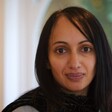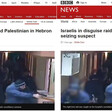Media Watch 7 October 2013
The BBC has admitted it breached its own editorial guidelines in presenting a pro-Israeli commentator as an independent analyst during Israel’s assault on Gaza in November 2012.
Over the course of just two days, the strongly Zionist Jonathan Sacerdoti made four separate appearances on the BBC’s rolling news channel, BBC News 24, to give his assessment of the events leading up to Israel’s assault.
On each occasion, he was presented as a neutral expert on Palestine and Israel, the director of an independent think-tank, The Institute for Middle Eastern Democracy.
However, Sacerdoti is far from neutral on the subject of Israel.
He previously worked as director of public affairs at the Zionist Federation and, in 2012, he was elected to the International Division of the Board of Deputies of British Jews. The International Division’s primary work is to promote Israel.
In August 2011, the BBC’s “independent expert” spoke at a pro-Israel rally in Trafalgar Square organized by the British Israel Coalition and supported by the Israeli government, where he was pictured draped in a large Israeli flag.
Sacerdoti defended Israel’s killing of nine unarmed Turkish activists on the 2010 aid flotilla to Gaza in an interview on Al Jazeera.
Supposedly neutral
None of this information was made available to the BBC News 24 audience. Viewers were kept in the dark as to his pro-Israel affiliations, while he was given authority and credence as a neutral expert by the BBC’s news anchors.
On Sacerdoti’s first BBC appearance on 14 November, the day Israel began its eight-day bombing of Gaza, the BBC presenter introduced an item taglined “Israeli Air Strikes.”
Turning to his studio guest, he said: “We can get more on this now and speak to Jonathan Sacerdoti, the director of the Institute for Middle Eastern Democracy.”
BBC News 24 viewers, given no information about Sacerdoti’s background, would have believed they were hearing a factual analysis from an independent think-tank expert.
In reality, what the BBC was giving them was a heavily biased personal opinion promoting Israel’s brutal assault.
This can only have advantaged the Israeli government and been of detriment to the Palestinians, as Sacerdoti used each of his four BBC appearances to defend Israel’s attack and denounce Gaza’s dead as “terrorist bodies.”
No commentator was interviewed alongside him to give the Palestinian point of view. The name of his supposedly neutral think-tank remained on the screen throughout his interviews.
Admission of wrongdoing
Palestine Solidarity Campaign (PSC) wrote to the BBC to ask why it was misleading viewers in this way. An eight-month correspondence ensued, with the BBC initially claiming it had reported in an “impartial, accurate and fair manner.”
However, PSC continued to insist that the BBC had breached its guidelines on impartiality by presenting a man with a clear pro-Israeli agenda as an independent spokesperson, a move which could only be of benefit to the Israeli government while disadvantaging the Palestinians.
PSC also informed the BBC that it had breached clause 1.2.3 of its editorial guidelines on accuracy, which state: “The BBC must not knowingly and materially mislead its audiences.”
The BBC was further challenged on the issue by Hilary Aked, who writes for Spinwatch, an organization which investigates the distortion of public debate by public relations, corporate and government propaganda.
Yet for nearly a year, the BBC continued to defend the fact that it had withheld vital information about one of its commentators from its news audience.
Finally, this week, it made a public admission that it had been wrong.
Breach of guidelines
In an online acknowledgement, the BBC writes: “Mr. Sacerdoti was introduced as the Director of the Institute for Middle Eastern Democracy, and it was not made clear that he is an active proponent of the Israeli viewpoint … viewers should have been made aware that he was not a neutral commentator.”
In a separate letter to PSC, Fraser Steel, head of editorial complaints at the BBC, said the broadcasts had breached the following clause in the BBC’s editorial guidelines on accuracy:
We should normally identify on-air and online sources of information and significant contributors, and provide their credentials, so that our audiences can judge their status.
Steel admitted that, during his appearances on News 24, Sacerdoti “offered an essentially pro-Israeli narrative and pro-Israeli analysis.”
However, Steel added that he did not believe there had been a breach of the BBC’s guidelines on impartiality, a decision which is currently being challenged by Aked.
Will the BBC be more careful in the future to ensure that its huge audiences are given full and accurate information about the people it invites to comment on matters of global importance?
In its online acknowledgement, the BBC writes:
The production team [of News 24] have been reminded of the importance of clearly summarizing the standpoint of any interviewee where it is relevant and not immediately clear from their position or the title of their organization.
But what about the rest of the BBC? Have all its production teams received the same reminder? On this, there is silence.






Comments
This is unbelievably biased,
Permalink jet replied on
This is unbelievably biased, im so shocked...the BBC is Israeli propaganda mouthpiece.
BBC bias
Permalink John Dowdle replied on
Why are you - or anyone else - shocked by the revelation of BBC bias?
The fact that it has taken over a year should tell everyone something.
It tells me that they rely upon people giving up on their complaints.
That way, they are left free to continue promoting bias in their coverage.
Arguably, the BBC has NEVER EVER been impartial or unbiased.
BBC bias
Permalink Michael Phillips replied on
The BBC has many hidden agendas from promoting alcohol consumption to the promotion of racial intolerance which includes sociocide in many parts of the world. The question is to what end. There has been nothing reported on the BBC about the segregation of Ethiopian Israelis and the rumored forced sterilisation of the women of this group, though it has had some coverage by other sectors. Why?
BBC bias
Permalink Dowdle replied on
I searched on-line on the BBC web site and there is no mention of the story at all.
I read about the story in the Jerusalem Post while in Jerusalem in March this year.
Strange that RT show it: http://rt.com/news/israel-ster....
I believe the Israel authorities have had a change of sentiment ever since it was established that the Ethiopians have no genetic connection with Ashkenazim.
I believe they now regret flying them out of Ethiopia and into Israel.
Their covert contraception policy is clearly designed to keep down the numbers of Ethiopian Jews in Israel and the fact that they originate from Africa has clearly become more controversial in Israel where public displays of anti-African racism have recently become conventional behaviour for fascist Israelis.
I realised a long time ago
Permalink Anthony replied on
I realised a long time ago that the BBC is increasingly just a mouthpiece for the establishment. On foreign policy, the Middle East, the Windsors, the drive for Scottish independence and not least on Palestine the role of the BBC is to deliver the views of the state.
Sacerdoti a closet propagandist for Israel
Permalink francis replied on
What else is new?